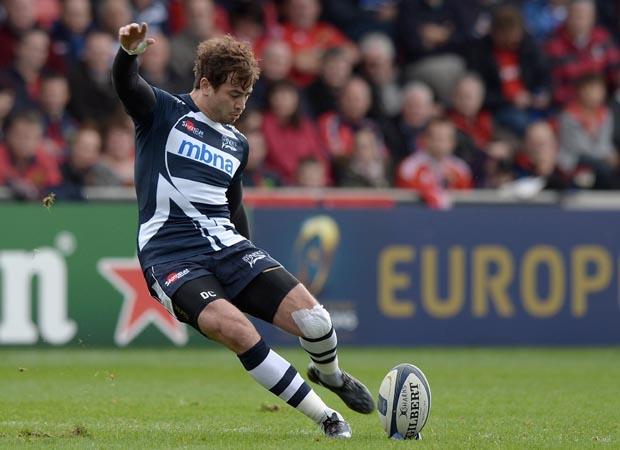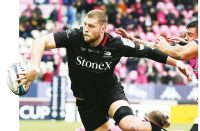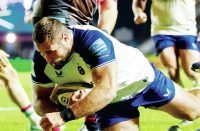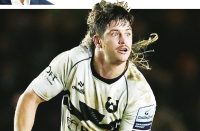 The best thing that’s happened to Danny Cipriani this season is that we are talking about him being good rugby player showcasing his talents rather than being involved in some off-field incident that has made the gossip columns.
The best thing that’s happened to Danny Cipriani this season is that we are talking about him being good rugby player showcasing his talents rather than being involved in some off-field incident that has made the gossip columns.
There’s a lot more Cipriani can achieve in the game at the age of 27, and he’s enjoying a great run of form at the moment with Sale Sharks. He’s one of those players who has the talent to get better and better when he’s on a roll – but for that to happen he needs to play regularly and be challenged.
One of the most impressive gains that Cipriani has made has been turning round his defence, which was the biggest weakness in his game. This season he has an 88 per cent tackle success rate in the Premiership, which puts him in pretty good company.
However, he now has to face another of the hard facts of international rugby, which is that you must have a high success rate if you are a frontline goal-kicker. Cipriani’s biggest obstacle is that his 69 per cent conversion rate with Sale is not good enough for a first-choice kicker at Test level. It means that unless England have another kicker in a different position to fly-half, his chances of being selected are minimal.
George Ford does not warrant losing his starting slot as England No.10 because no one – including Cipriani – has played well enough to push him out. The question then is whether there is a spot on the bench for the Sale fly-half, and the answer is probably not, because of his kicking percentages.
Ford, who has an 81 per cent strike rate compared to Owen Farrell‘s 80 per cent, has worked incredibly hard on his goal-kicking. For an instinctive rugby player the process of goal-kicking is a tough mental discipline, where for one and a half minutes your focus has to be total. That is a challenge to a creative mind that is always ticking over and rushing from one stimulus to another. More creative players will have hot streaks, but, in my view, be less accurate goal-kickers than steadier players. However, while practice might not make perfect, it can make a difference.
In attack Cipriani is running well, and while he’s not setting the Premiership on fire, he’s doing the basics of being direct and getting the Sale line going pretty effectively.
If you compare his attacking statistics with those of Ford, there is not a lot a difference between them. When it comes to carries, metres run, and defenders beaten, Ford is only marginally ahead – and although he has double the try assists (9-4) he has one fewer clean break (6-7).
One of the discussion points that emerged this week was the suggestion that Cipriani is disadvantaged because he plays for an unfashionable club. I don’t buy that. It’s like saying that Sale are not a good club, and I don’t believe that is the case.
There is no getting away from the fact that a winning team is talked about more than a losing one. It grabs more headlines than a team that blows hot and cold. And you cannot ignore that Sale are eighth in the Premiership because they have lost six games, and scored 36 tries, while Northampton are top having lost three and scored 48 tries.
However, Sale are not a million miles away from being a top English club, just as Cipriani is within touching distance of an international recall.
I was impressed with him on England’s summer tour of New Zealand, where he did himself a favour. I have no doubt he can live at international level because his skill-set is good enough in any company. The factor that will determine Cipriani’s success, or otherwise, at that level is his decision-making.
What Cipriani brings to any team is a different way of thinking. He has that ability to attract defenders and create space through his movement on the ball, mainly because they cannot work out what he is going to do next. Ford, who is deceptively quick, is similar, but probably doesn’t have quite as many options running through his head as Cipriani. As a result, Ford looks more commanding and authoritative – you believe he will make the right decision more often than not.
With Cipriani you think, ‘what’s he going to do now?’ As an observer in the stands that element of uncertainty is great, but it’s not so good if you are a coach.
Naturally gifted players like Cipriani, Ford and Charlie Hodgson see multiple options and then sift them before, hopefully, picking the right one. What I sense with Cipriani is that he sees even more options and selects at the last second, hence the unpredictability. That’s why you cannot restrict a player like Cipriani to a move-by-move game plan – you have to let him play.
The hardest job for an international coach is selection, and that involves working out what significance you give to the data that is collected and available on each player. Perhaps the most significant data concerning Cipriani is that he is getting talked about now for the right reasons. There is no way he is in the same place he was when he went off to Melbourne in 2011 — he was angry and emotional at not being in the England set-up so he got away from it.
There’s been talk of Cipriani going to France if he isn’t selected for the Six Nations, but if his aspirations are to make this World Cup, or the next one, he has to stay in England to challenge for the shirt.
I believe that he should be in Stuart Lancaster’s squad announced on Wednesday, but if he’s not in England’s top 60 then his thoughts may turn to moving to a Toulon side that is a near international-strength team with great support – and where winning trophies is realistic.























